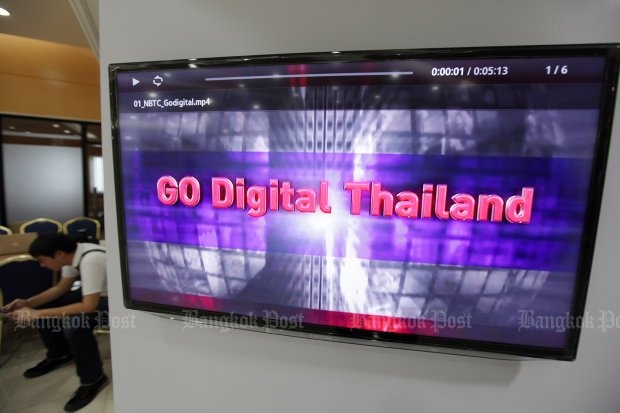
The military government will soon invoke Section 44 to ease the chronic financial burdens of the existing terrestrial digital TV operators at the expense of the state.
The measure, which will also allow the two winners of the 2015 4G mobile licence auction on the 900-megahertz spectrum to postpone their auction payments, is expected to spark widespread public outrage.
"We [the government] have already agreed that, in principle, Section 44 is the sole way to resolve the financial crisis TV and mobile operators are facing," said Deputy Prime Minister General Prawit Wongsuwan.
Gen Prawit said the operators' financial relief measures will soon be on the agenda for the National Council for Peace and Order (NCPO).
But Gen Prawit did not mention an exact time when Section 44 will be invoked, saying it depends on Deputy Prime Minister Wissuna Krea-ngam, who will submit the measure at the NCPO meeting.
Gen Prawit has sent the first clear signal on the matter after the Association of Digital TV Operators first asked for assistance a year ago.
The association submitted its proposal to the government to help to ease the situation in two main categories.
The association first requested the elimination of broadcasting networks' rental fee or MUX (which is due in January 2018), as well as to waive the remaining licence payments after the May 2018 payment, and to allow operators to exit the business. These are the most urgent requests, according to the association.
Next, the association, along with other related broadcasting associations, asked the National Legislative Assembly (NLA) to review the frequency allocation law and the Broadcasting Act of 2008.
The National Broadcasting and Telecommunications Commission (NBTC) granted 24 digital-TV licences to 17 winning bidders in 2014, worth a combined 50.9 billion baht. The winners have to pay licence fees over six years.
Digital TV operators have paid a combined 34 billion baht to the NBTC or 64% of the amount owed.
In December the NBTC officially endorsed a three-year suspension of terrestrial digital TV operators' licence payments by requesting the NCPO invoke Section 44, allowing operators to postpone their payments, starting from May 2018.
The regulator also offered to use its Broadcasting and Telecommunications Research and Development Fund to subsidise 50% of the rental fees for broadcasting networks to help digital TV operators pay a combined 2.5 billion baht per year.
NBTC secretary-general Takorn Tantasith said the crisis affecting digital TV operators reverberates out to related businesses and their employees.
Two winners of the 900-MHz licences, Advanced Info Service (AIS) and True Move, jointly asked the government to invoke section 44 to extend the term of their licence payments in 2019.
The last payment that each company must make to the state totals 60 billion baht each.
But Mr Takorn said the government is concerned over how the financial burdens from those payments will affect the planned 5G licence auctions in 2018.
The NBTC board issued a resolution in support of both AIS and True Move, but cannot allow the two winners to suspend payment unless an order under Section 44 to that effect is issued.